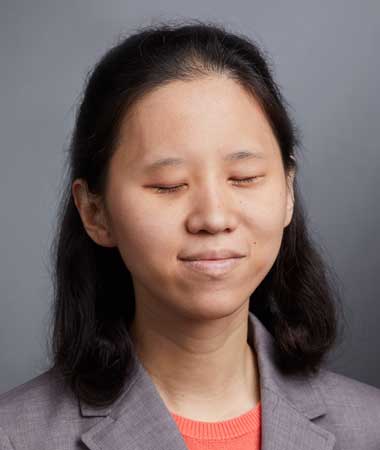First Person
Back Page: Structural Stigma and the Health of Marginalized Communities
Katie Wang is an assistant professor in the Department of Social and Behavioral Sciences at the Yale School of Public Health.

Growing up, how did you become interested in social psychology?
I became interested in this field when I took my first course in social psychology as an undergraduate. I was fascinated by the creative methodological approaches social psychologists utilize to examine important aspects of human behavior, ranging from close relationships to intergroup conflict. I was especially impressed with the field’s commitment to understanding and addressing social inequalities. As an Asian American woman with a disability, I have long been committed to improving the lives of marginalized populations and found social psychology to be an ideal avenue through which I could pursue this goal.
What helped to shape your focus on studying stigma as a determinant of health disparities among marginalized populations?
Although I very much enjoyed my training in experimental social psychology as a graduate student, I also realized over the course of my doctoral training that my passion lies in understanding and addressing the long-term consequences of stigma in relation to population health and well-being. I subsequently had the opportunity to further hone these interests through a postdoctoral fellowship under the mentorship of a clinical psychologist whose work focuses on the mental and behavioral health impact of stigma on members of the LGBTQ+ community. Taken together, these training experiences helped inform my current program of research, which examines the role of stigma as a driver of mental and behavioral health inequities through an interdisciplinary lens that integrates theories in social psychology, clinical science, and public health.
What would you like other psychological scientists to understand about the consequences and implications of stigma—and where do you see the need for further research?
While psychologists have traditionally conceptualized stigma as an interpersonal phenomenon, my interactions with colleagues and students in public health have heightened my awareness of how stigma can operate through structural processes (e.g., inaccessible environments, inequitable laws/policies) to disadvantage socially marginalized populations. To this end, I believe that more research is needed to elucidate the psychological mechanisms underlying the health impact of structural stigma. I also believe that more attention should be devoted to identifying sources of resilience among members of marginalized communities. In other words, what personal and environmental resources enable stigmatized individuals to thrive despite pervasive oppression and adversity? Addressing this research question would help inform the development of tailored psychosocial interventions to improve the health and well-being of stigmatized individuals.
The research you presented at the 2022 APS Annual Convention explored how the pandemic exacerbated many existing challenges for people with disabilities. How personal was this research for you, and what helped you remain healthy and productive during those difficult times?
This research was very much motivated by my personal experience as someone who is blind, as well as the experiences of my friends and acquaintances in the disability community. While I was personally fortunate enough to have family support during the height of the pandemic and did not encounter many of the practical difficulties experienced by my disabled peers (e.g., limited access to groceries/medications, transportation challenges), I was acutely aware of my dependence on my support network and deeply frustrated by the fact that people with disabilities were often treated as an afterthought in our society’s pandemic response. Setting time aside for connecting with loved ones, regular walks, and good books helped me stay centered and productive.
How can the scientific enterprise broadly—including societies, publishers, and educational institutions—better support and empower researchers who are members of the disability community, including students who might become part of the next generation of researchers?
Ableism remains pervasive in academia and in our society more generally, yet it has received little attention in conversations surrounding diversity, equity, and inclusion. In order to better support current and emerging disabled scholars, the scientific enterprise as a whole needs to recognize ableism as a form of social oppression that is just as significant and harmful as other forms of marginalization, such as racism and sexism. One way to do this is by ensuring that all aspects of the scientific process (e.g., publishing, conferencing) are maximally accessible and inclusive for people with a wide range of disabilities. It is also important to include disabled voices and perspectives in public forums (such as the APS Observer) as well as to provide dedicated resources to support the professional development of disabled scholars, such as mentorship programs, grants, and training fellowship opportunities.
Back Page showcases particularly interesting work by a wide variety of psychological scientists. Know of a good candidate for a future profile? Contact the Observer at [email protected].
Feedback on this article? Email [email protected] or login to comment.
Related content we think you’ll enjoy
-

Implicit Bias
Unconscious bias can lurk below the level of conscious awareness, but researchers are working to uncover more effective methods of reducing these prejudices.
-

Bias and Stigma
Psychological science on the effects of prejudice, and how to counter these beliefs.
-

APS Global Collaboration on COVID-19
Six working groups explore how psychological science can more effectively inform solutions to pandemics.





APS regularly opens certain online articles for discussion on our website. Effective February 2021, you must be a logged-in APS member to post comments. By posting a comment, you agree to our Community Guidelines and the display of your profile information, including your name and affiliation. Any opinions, findings, conclusions, or recommendations present in article comments are those of the writers and do not necessarily reflect the views of APS or the article’s author. For more information, please see our Community Guidelines.
Please login with your APS account to comment.